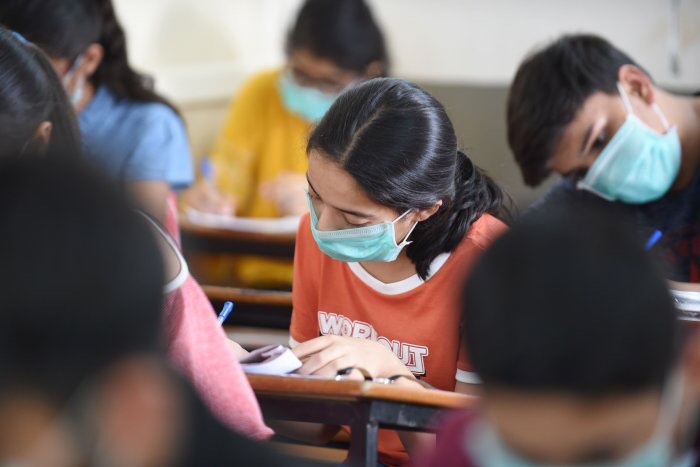Disclaimer: None of the solutions or suggestions mentioned below are in any manner representative of the views of Vox Populi and are solely based on the responses collected through the Google Form. This survey is not reproducible without permission and due credits. (Contact voxiitk@gmail.com for queries related to the same)
Also, this is to clarify that Vox did not take this survey on behalf of the Senate Subcommitee for Academic Calendar 2020. And the decision-making body had not used the survey as a primary resource in its discussions.
———————————————————————————————————————————————————————
The COVID-19 pandemic and the unprecedented lockdown that followed has led to a lot of uncertainties for the campus community. What happens to the joining dates of jobs? What about internships? What about this semester? There are questions bothering us all. While an Academic Senate appointed sub-committee is working on the solution, we tried to understand the student opinion on the same. We conducted an online survey that attracted 3180 responses covering all spheres of the campus community. Here, we present you the findings.
Current Semester Plans
Coursework
There are two major aspects to coursework- mode of continuation of teaching and the potential options for grading in case of online content dissemination.
Teaching Concerns
When we asked respondents to choose one or more favorable options from among 6 options, we got the following results-
[infogram id=”dc59c5ee-217d-46c5-aff9-3e0eb1dd3581″ prefix=”X3M” format=”interactive” title=”FavouredPlans”]
At a glance, waiting for the institute to reopen is the most preferred option for PGs and third most preferred option for UGs. However, approximately 73% of students (2332 students out of a total of 3180 respondents) are in favor of at least one option with online content dissemination. This implies that online content dissemination was cumulatively preferred by a large margin over ‘waiting for the institute to reopen’, for both PGs and UGs.
However, a number of respondents remarked that any sort of online content dissemination must be supplemented with channels like Piazza or Acadly and mini-projects/assignments.
Grading Concerns
To figure out a new grading policy if online teaching happens, we asked our respondents to choose favourable options from among the following 5 options-
-
Examinations when Institute reopens
-
Online graded assignments followed by letter grades
-
S/X grades based on performance so far
-
Prorating based on performance so far
-
Exams after the summer term
Undergraduate students
Preferences on grading showed a very diverse distribution.
With 33.2% UGs in favor, giving S/X grades based on performance so far was the most preferred option amongst UGs. However, a number of students raised concerns over the criteria for branch change if S/X grading policy is followed. Conducting exams when Institute reopens followed as a close second with 32% votes. 24.9% of students favored having lettered grades based on graded assignments. However, some students claimed that grading on the basis of assignments wasn’t fair due to poor economic, internet or medical conditions in some homes.
Prorating on the basis of performance so far was favored by 22.7% of students. Graduating students who fear that they’d fail if given grades as per performance so far, raised concerns about their jobs and higher study plans getting affected due to such a policy. Also, students enrolled in courses that require minimum attendance for passing claimed that prorating would be unfair in such courses as even though their attendance is not beyond threshold till half-semester, they planned to cover it up in the next half. Some students remarked that if prorating is adopted, then the opportunity to drop courses must be given.
An exceptionally large number of concerns about prorating were received from PHY103 students claiming that due to the extremely low averages and marks received in mid sems, prorating would make little sense. No wonder, with only about 10% Y19s favoring prorating (59 out of 589 Y19 UG respondents), the percentage of UGs preferring prorating was significantly skewed due to PHY103 scares.
Some novel suggestions received included-
- S/X grades on basis of online graded assignments (and not lettered grades)
- Prorating with one grade higher than what a student would have got by simply prorating based on performance so far. This will help people who feel it is unfair as they wanted to improve in the end-semester examinations
Postgraduate Students
For PGs, on the other hand, conducting exams once institute reopens and giving letter grades based on performance so far were the most preferred options with 29.8% and 27.9% respondents in favor, respectively. Interestingly, for both UGs and PGs, conducting exams after summer term ends turned out to be the most unpopular option.
Grading Lab Courses
Undergraduate students
When we asked undergraduate students their opinions on grading lab courses, prorating was the most preferred option, with 23.3% students preferring prorating and an additional 22% students preferring prorating with a minimum of D grade.
[infogram id=”a686945e-33e3-4b9f-bf8f-e2cf59b5308b” prefix=”wfA” format=”interactive” title=”LabCourses”]
Other interesting suggestions we received include-
- Conducting lab courses during the winter break
- Online labs for programming courses
- Conversion to online theoretical quizzes and giving marks henceforth
- Providing online demonstrations for labs
- “S/X for lab courses with 3 credits (like PHY101, CHM101) but something more elaborate for more extensive lab courses (ESC101, TA101)”
- Completing labs over weekends when institute reopens
A number of respondents believe that “Learning is more important than grading.” Thereby, they suggested for labs to be continued as per regular timetable when the college reopens. Most students suggested against a blanket grading policy and asked the institute to recognize the diverse nature of courses and finer nuisances associated with each course. Rather, a course-wise plan considering the differences in the extent of work and time involved must be prepared.
Postgraduate Students
Unlike undergraduate students, the PG responses were well distributed among the different options. Completing all labs in one/two weeks after institute reopens was the most preferred option, chosen by 26.6% of 620 respondents. Making them S/X courses followed as a close second with 22.6% responses. A peculiar case of ME231A course was pointed out by a respondent who claimed that half the students enrolled have done their labs in the first half of the semester and the other half was supposed to do the labs in the second half. Hence, none of the suggested policies would work for such a course.
Internet Connection Concerns
One of the primary concerns of the Institute with adopting online content to teach has been the lack of good enough internet connections for all students. To know the ground reality, we asked our respondents about their internet connections, and we found out that only 9.3% of 2789 respondents claimed that they cannot download any material or cannot study online. On the other hand, an overwhelming majority of students have good enough internet connection to download slides/PDFs.
[infogram id=”9988a262-49b2-499c-9556-589c94cb9e11″ prefix=”rpu” format=”interactive” title=”InternetIssues”]
However, only about 34.1% of students (both UG and PG) have internet connection good enough for streaming lectures. If the semester is to be continued online, it could be continued through slides/lecture notes or short video contents rather than live lectures. Some students suggested having audio lectures along with slides. A number of respondents from remote areas raised concerns over online content due to unreliable internet services and frequent blockages. Also, multiple concerns regarding laptops, notes, and material being left on campus were received. A student gave an interesting suggestion to give projects and assignments to students in groups so that people with low access to the internet can take the help of others. Another respondent remarked that most people have good internet speed but limited data usage and hence, shorter videos can be streamed.
Research Work
The other component of academics at IIT Kanpur which majorly concerns postgraduate and PhD students is research work. When we asked postgraduate students, what kind of work their research involves, 22.6% of students have experimental work only and hence, they cannot continue work from their home.
[infogram id=”ef7c7adc-3427-4226-a014-8c349046f836″ prefix=”k86″ format=”interactive” title=”RsearchWork”]
However, even the other students (who have either computational/theoretical work only or a mix of both- computational and experimental work) are also unable to continue their work reasonably from home. A majority(53.6%) of students are unable to continue their work from home due to a lack of resources. Other reasons for not being able to continue work from home include- lack of interest(7.9%), inability due to household chores (6.3%) and health issues (1.7%). Only 30.6% of students replied in affirmative.
Hence, not only is returning to campus essential for PG/PhD students to continue their work, it is important for them to get back soon to prevent their experiments from getting extended. Few responses said that they work with drosophila/flies which need proper maintenance and food supply in the labs and hence they need to get back soon, otherwise, it would result in an extension of their experiments.
Summer Semester Concerns
The summer period is an ideal time for fresh graduates to prepare for academic applications, for examinations like UPSC, MBA, GATE amongst others. 40 of the 321 UG Y16 respondents agreed that an extension in the semester will mean they would lose these opportunities they had planned for.
58 of the 450 respondents from the graduating batch mentioned that they required the summer term to complete their graduation requirements. In addition, 55% Y17s and 16% Y18s have finalized summer internships which might be severely impacted.
[infogram id=”c0bf3730-b847-4a29-806a-16aa9902fe4e” prefix=”qKs” format=”interactive” title=”ConcernsWithSemExtension”].
For the first-year students, summer is a good time to try around different club projects, take up courses or even self-study courses. 328 of our 591 UG Y19 respondents said that they had planned to take up courses in the coming summers.
[infogram id=”00c93cb9-43ab-4269-af96-917d674e4b06″ prefix=”1aD” format=”interactive” title=”SummerStay”]
The survey also brought forward the concerns of a number of MBA students, where they brought to light the fact that given the short duration of their course, the summer internships are valuable.. They suggested that case analysis submissions could be taken up online and online platforms could be used for doubt clearance so that the summer internship period is not compromised.
About 84% of the PG respondents had concerns relating to their research work and their thesis work which they would have completed this summer. Cancellation of the summer semester might mean an extension of their degree. The delay in academic proceedings could end up being a major financial issue for several students and hence, concerns were expressed regarding stipends for the remainder of the semester.
Job and Internship Related Concerns
If the semester were to be extended into June and July, 180 of our graduating respondents would have joining date clashes and 395 of our respondents would have clashes with internship dates. 596 students have job or internship offers that haven’t been rescinded yet.
[infogram id=”8922bca2-91b2-4a37-bb50-7a7490a48e0c” prefix=”HSz” format=”interactive” title=”Abroad”]
Around 65 of these students were scheduled to travel abroad. A semester extension to June-July would mean a clash with these dates, said students. Most coveted research programs for undergrads like MITACS (Canada) and DAAD (Germany) have been canceled, while others have been put on hold until further notice. Due to a mix of COVID-19 and other economic factors, some top summer recruiters, including a Day 1 recruiter, have rescinded their offers. However, some companies have already started looking into work-from-home options for their interns. The extension of the semester would affect the students interning at these firms. About 46% of respondents (939 out of 2047) wanted the semester to proceed online for its remainder and have graded assignments in case letter grades are to be given or have online classes alongwith S/X grades in case of prorating being done.
Suggestions Received
We received a number of actionable and novel solutions from our respondents. Here are the excerpts-
- No blanket decision should be taken but the Instructor must be asked to choose from a set of options
- Students must be allowed to choose from options deemed acceptable. Any policy for online grading must be complemented with a choice for offline grading as well.
- Since a new grading policy is going to be declared, students must be given the option to drop courses.
- Entirely online summer semester
- As for many students, missing the summer semester may impact their degree completion time, a buffer of 25 credits and relaxation of credit limits and pre-requisites can be given in the upcoming two semesters of the year.
- Professors must offer projects/assignments in groups (even if they are ungraded) so that students with poor/ no internet connection can also learn.
Credits: Abhimanyu Sethia, Aryan Pandeya, Farzan Byramji, Milind Nigam










